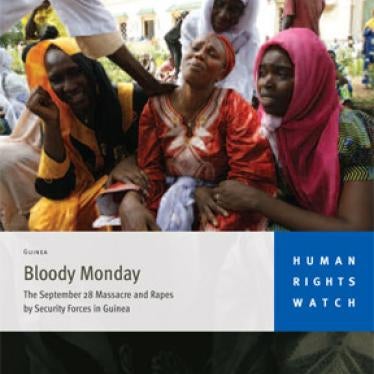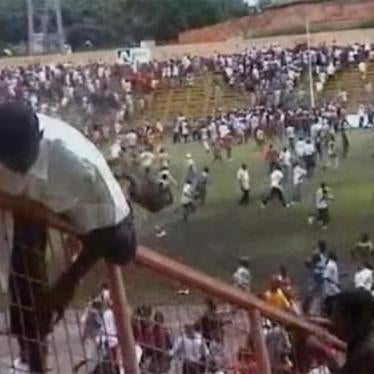(Johannesburg) – No one has been held to account two years after Guinean security forces gunned down unarmed protesters at an opposition rally in Conakry, the capital, Human Rights Watch said today. The Guinean government needs to do more to ensure justice for victims of the massacre on September 28, 2009, Human Rights Watch said.
The killings occurred as tens of thousands of protesters gathered peacefully at the main stadium in the capital to protest the continued military rule of Capt. Moussa Dadis Camara, then the country’s leader. Members of the Presidential Guard, gendarmes, anti-riot police, and militia in civilian clothes opened fire on the crowds in the packed stadium and on people struggling to escape. At least 150 people were killed, and more than 100 women at the rally suffered brutal sexual violence at the hands of the security forces.
“The stadium massacre was shocking, and yet two years later no one has been held to account,” said Daniel Bekele, Africa director at Human Rights Watch. “The Guinean government should learn from the country's recurring cycles of violence that stability will not last if justice is swept under the rug.”
Human Rights Watch and the United Nations-led International Commission of Inquiry concluded that the killings, rapes, and other abuses by the security forces on September 28 and the days that followed were part of a widespread and systematic attack, and as such, very likely constituted crimes against humanity.
In October 2009, the International Criminal Court (ICC) prosecutor confirmed that the situation in Guinea was under analysis, and that his office was determining whether to initiate a formal investigation. The ICC may open an investigation for the most serious crimes if member countries are unable or unwilling to do so. Later the same month, the government of Guinea committed to investigate and bring those responsible for the attacks to justice.
Three judges were named to an investigative panel in early 2010, and some progress has been made. In May 2010, the ICC reported that the investigating judges had interviewed 200 people. The following month, two people were reported detained for their alleged involvement in the crimes. Since then, a third person has been charged with crimes related to the September 2009 killings and rapes.
On January 19, 2011, Interpol issued a Red Notice for Aboubacar Sidiki Diakité, the head of the Presidential Guard, or red beret troops, at the time of the massacre, who has been directly implicated in the crimes.
Human Rights Watch was also encouraged by recent improvements in working conditions for the investigative judges, who were moved to new premises and assigned gendarmes for protection in September 2011. During a mission to Conakry in May, Human Rights Watch had expressed concern about what appeared to be inadequate security for the judges working on the case and had urged national authorities to address this problem.
However, there has been scant information regarding the status of the investigation in the last several months and no indication of government efforts to locate the more than 100 bodies believed to have been disposed of secretly by the security forces, Human Rights Watch said. In addition, the military hierarchy has failed to put on administrative leave, pending investigation, soldiers and officers known to have taken part in the September 2009 violence.
“The countless people whose lives were scarred by the massacre are still waiting for justice,” Bekele said. “It's hard to imagine that there can be any real healing without it.”
Human Rights Watch is also concerned that President Alpha Condé has appointed two people to government positions who, based on Human Rights Watch investigations, are implicated in the September 2009 violence: Lt. Col. Claude Pivi as minister of presidential security, and Lt. Col. Moussa Tiégboro Camara as director of the National Agency against Drugs, Organized Crime, and Terrorism.
In addition, Human Rights Watch has identified several key challenges to ensuring that domestic investigations and prosecutions are conducted fairly, impartially, and effectively. These include the absence of a witness protection program, inadequate material resources for the judiciary, and antiquated penal codes. To ensure meaningful justice for the serious international crimes committed in 2009, the Guinean authorities should promptly and credibly address these issues, Human Rights Watch said.
The ICC prosecutor's office is monitoring the proceedings in Guinea.Although it has commended both the technical ability of the investigating judges and their demonstrated independence, it urged the government to increase accountability efforts and reiterated the ICC's responsibility to take action if the government fails to do so promptly and adequately.
It has been reported that Condé recently declared that September 28 would be a day of “national reconciliation.” However, the Guinean government has refused victims’ groups a permit for an event intended to mark the second anniversary of the massacre. In a letter to victims’ groups dated September 22, authorities cited the need to preserve peace and national unity in the current socio-political context as the reasons for refusing the request.
“Declaring September 28 a day of reconciliation does not free Guinean authorities from their responsibility to prosecute those responsible for killings, rape, and other serious abuses committed that day,” Bekele said. “Refusing victims the chance to assemble peacefully is at odds with the authorities' expressed commitment to accountability.”





